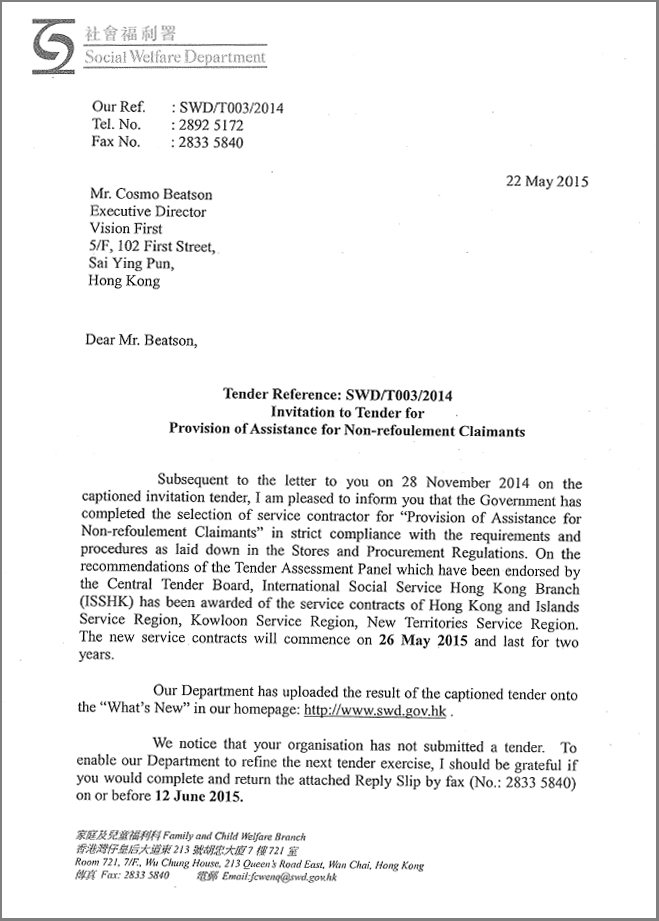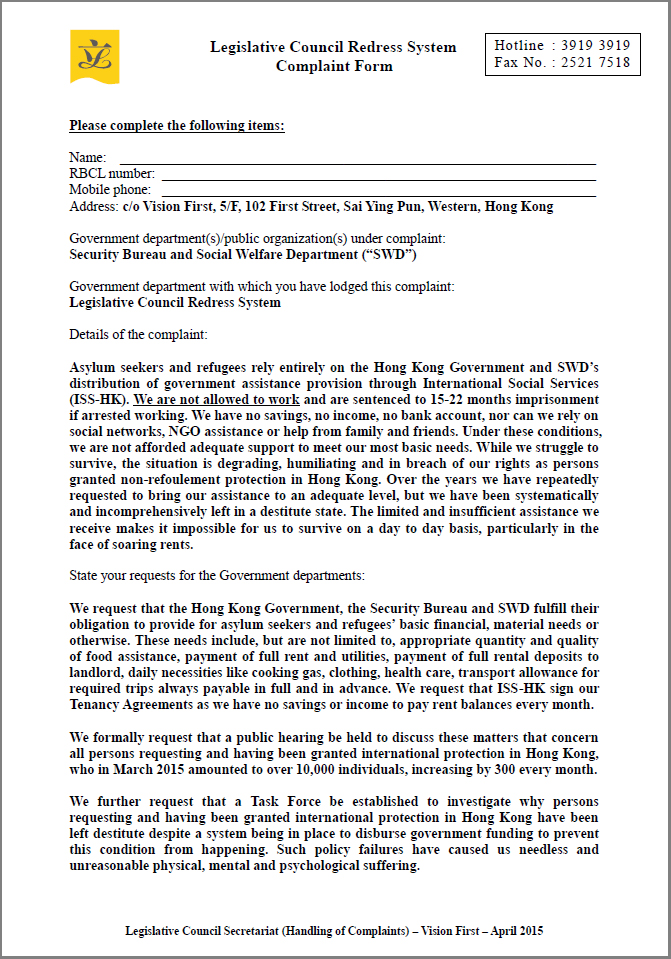Archive
Refugee Union brief lawmaker ahead of Legco welfare meeting
Jun 3rd, 2015 | Food, Government, Housing, Refugee Community, Welfare | Comment
How things have changed! Veteran refugee workers recall a time not so long ago when the SWD didn’t reply to emails about problems faced by their clients, because the task was delegated to its service contractor. By comparison today the Refugee Union communicates daily directly with the SWD head-office to report failures, lodge grievances and request assistance.
It is equally unprecedented that in April 2015 the Refugee Union approached the Legislative Council Redress System and filed 500 complaint letters drawing attention to their plight and campaigning for improvements. Vision First takes credit for paving the way that gives a voice to the voiceless and empowers refugees to stand up for themselves and demand the changes needed by their community.
Following a preliminary meeting on 22 April 2015, the Hon. Fernando Cheung Chiu-hung invited the Refugee Union to discuss welfare concerns ahead of the meeting of the Legislative Council’s Panel on Welfare Services on 8 June 2015. It is noteworthy that refugee welfare made the Panel’s agenda in under two months, compared to nine in 2013. Is it an indication that the wellbeing of refugees has gained in priority over the past two years? If so, what factors contributed to this?
Discussing the topic at hand, a Bangladeshi refugee told Fernando, “I have been in Hong Kong for 15 years and I am not allowed to work. Things are getting better. It seems the government is listening to our complaints and treating us like human beings. I lived in the slums for many years. They are closing down this year after a refugee died in a fire. It is true that for $1500 [in rent assistance] we cannot get a room anywhere. The government should increase the amount to $2000.”
An African colleague commented, “It is unreasonable that refugee without money or jobs are forced to sign agreements with landlords. Isn’t this cheating? We commit to deals we cannot keep because we cannot pay for the high rent. Is it entrapment? This policy makes us delinquent tenants when we don’t pay. ISS case-workers urge us to get money from NGOs and churches, who say they are also struggling to fundraise. Instead we suggest that our case-workers sign the tenancy agreements with the mandate of the government. All we want is a safe place to sleep.”
A refugee mother spoke about the food, “The coupons are better. There are some problems we need to resolve, but generally people are happy. However we need competition as Wellcome prices are not always cheaper. ParknShop and Kaibo supermarkets should be included. Why not give refugees an Octopus card accepted by these three supermarkets? Or Wellcome could match the lowest prices offered by competitors because already [the food allowance] is too little.”
A Pakistani added, “Yes, the coupons are good. I received $1200 also for my children and I hope it is the same for all families. It is impossible to live on $40 food so many refugees must work. The food allowance should be increased to $1500. Also, we don’t get dish soap or toilet paper [one roll a month] and razors [one a month] break in our hands. The SWD should save the money of toiletries, staff and storage to give us one more coupon to buy what we really use.” A woman then described sanitary pads considered of dreadful quality, unsafe and unhygienic.
The Hon. Fernando discussed these and other issues with the Refugee Union members, displaying genuine concern and a determination to push for improvements at the Legco Panel on Welfare Services on 8 June 2015. He noted that the 45 minutes allocated would only allow for the discussion of two topics, which were agreed to be rent and food – the greatest concerns of the community.
The previous increase in levels of assistance was introduced on 24 January 2014, when the monthly rent allowance was raised from $1,200 to $1,500, security deposits and estate agents’ fees were introduced and the food budget was increased from $1,060 to $1,200. Unlike the Comprehensive Social Security Assistance (CSSA) provided to needy residents, there is no mechanism to tie refugee assistance with inflation – an arrangement that ought to be considered by the Panel.
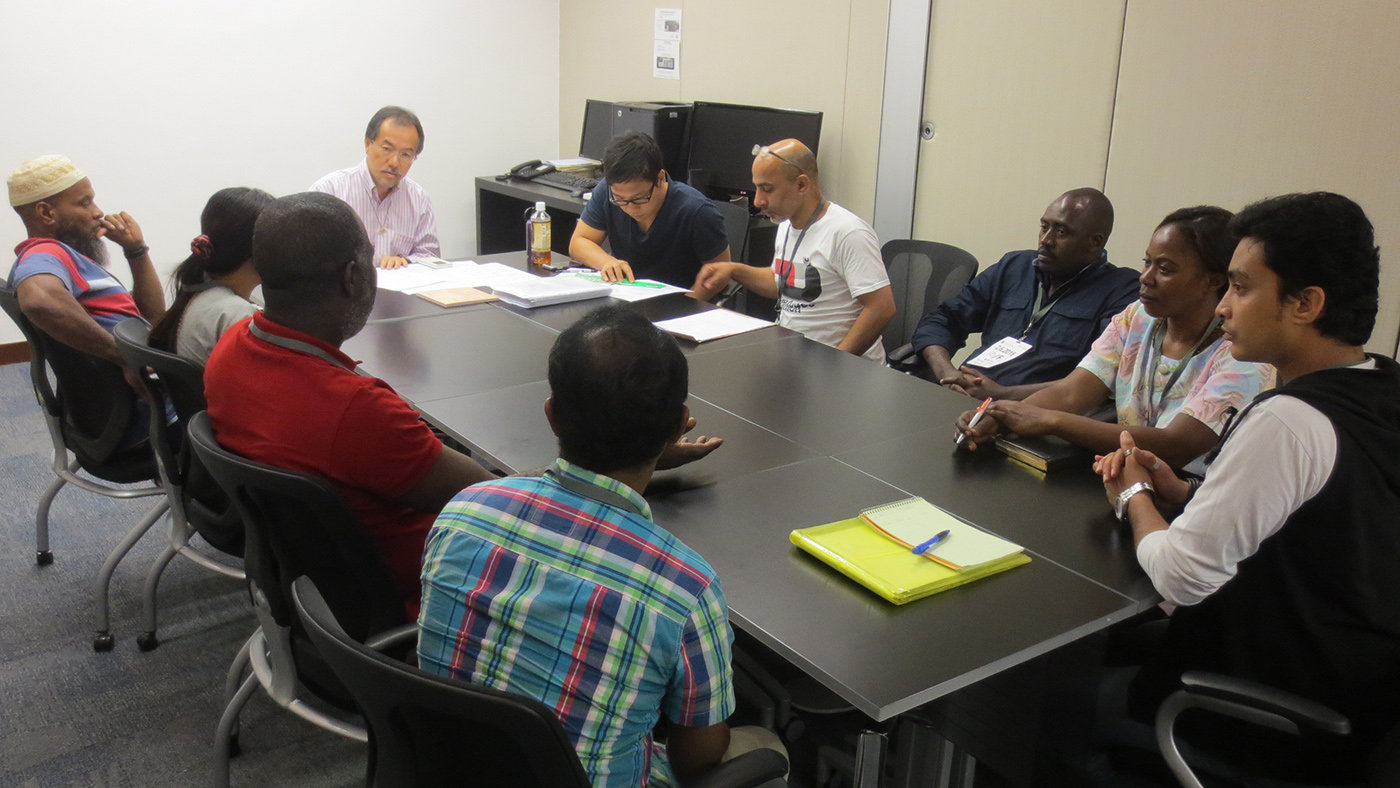
LegCo Welfare Panel to discuss refugee aid on 8 June 2015
May 30th, 2015 | Food, Government, Housing, VF Opinion, Welfare | Comment
On 1 April 2015, Vision First and the Refugee Union launched an action to file complaint letters with the Legislative Council Redress System. Several hundred letters were completed and lodged with the assistance of lawmaker Fernando Cheung Chiu-hung and his hardworking team.
The complaints to the Legislative Council summarized the daily plight of refugees who rely entirely on government welfare and are not allowed to earn an honest living. Most often, refugees have no savings, certainly no lawful income and most commonly cannot rely on limited social networks and NGO assistance.
It is widely recognized that the current levels of assistance offered refugees are grossly inadequate: $1500 in rent assistance, $1200 in food coupons and a few hundred dollars for utilities and transportation. Refuges are loath to rely exclusively on welfare, but stringent immigration policies punish them for working and leave them with no alternative.
Vision First request that the Hong Kong Government, the Security Bureau and SWD fulfil their obligation to provide for asylum seekers and refugees’ basic financial, material needs or otherwise. These needs include, but are not limited to, appropriate quantity and quality of food assistance, payment of full rent and utilities, payment of full rental deposits to landlord, daily necessities like cooking gas, clothing, health care, transport allowance for required trips always payable in full and in advance. We request that ISS-HK sign the Tenancy Agreements as refugees have no savings or income to pay rent balances every month.
Vision First further request that a Task Force be established to investigate why persons requesting and having been granted international protection in Hong Kong have been left destitute despite a system being in place to disburse government funding to prevent this condition from happening. Such policy failures have caused refugees needless and unreasonable physical, mental and psychological suffering.
On 22 April 2015, Vision First and representatives of the Refugee Union met with the Hon. Fernando Cheung Chiu-hung to present these concerns to the Legislative Council’s Panel on Welfare. Vision First noted that deterrence objectives and criminalization of vulnerable foreigners should not overshadow welfare considerations when refugees are suffering in our community. It stands to reason that, if work rights are denied to refugees, the authorities have a legal and moral obligation to increase welfare to realistic levels consistent with human right laws.
Following the above initiative, we are pleased to inform that the Legislative Council’s “Panel on Welfare Services” has scheduled “Issues relating to welfare of refuges, torture claimants and asylum seekers” for their meeting on Monday, 8 June 2015. Refugees are invited to submit suggestions to Vision First early next week.
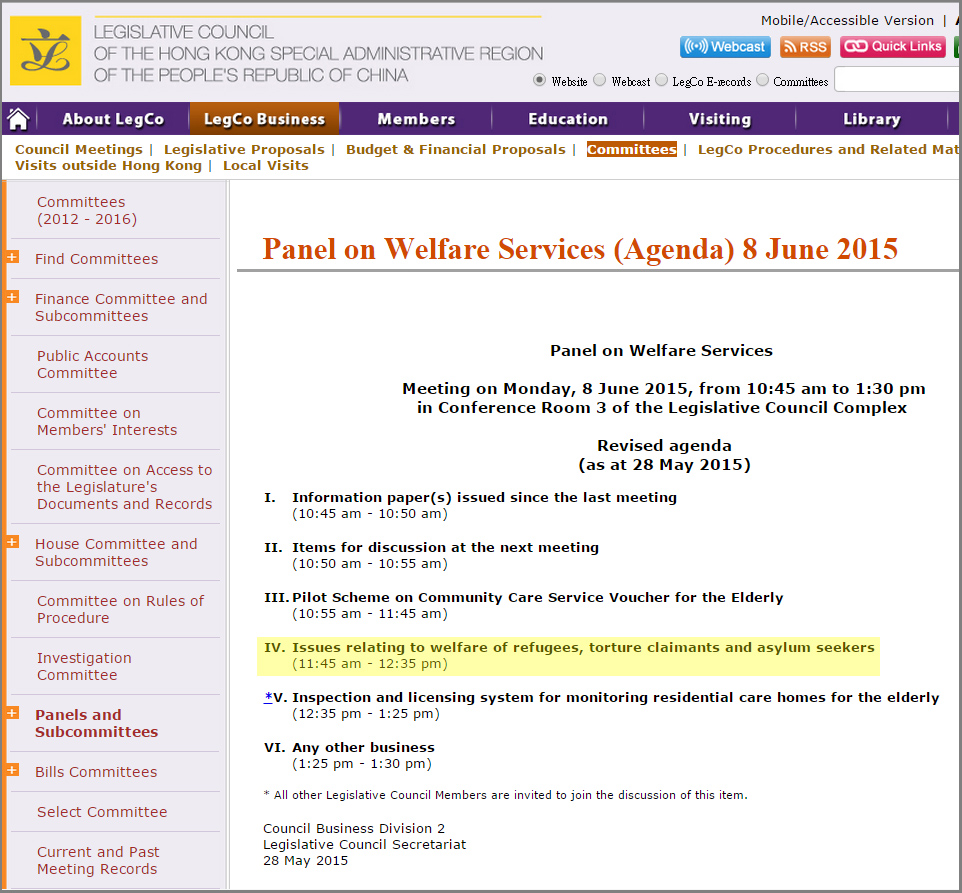
SWD awards new service contract for refugees to ISS-HK
May 22nd, 2015 | Food, Government, Housing, Welfare | Comment
Refugee mother secures rent increase after protesting at SWD
May 11th, 2015 | Housing, Personal Experiences, Welfare | Comment
I am a refugee mother relying on welfare assistance because I am not allowed to work. In 2013 I had a very big problem finding a home so ISS lodged my family in a guesthouse. Safety was a priority as we had been threatened. It was difficult as we could not cook, wash clothes and did not receive any fresh foods. It was very hard for my daughter to eat canned food and noodles every meal.
We looked for a place to stay but ISS only gave us budget of 4500$. On 30 April 2014 we moved out of the guesthouse to an apartment in Hung Hom. It was a studio room with a small kitchen and bathroom. The big problem was the bathroom flooded when there was heavy rain. There were always cockroaches and a terrible smell coming out of the drain.
We wanted to move, but my case worker told us to wait a year to get the deposit back because they would not pay it again. We had to stay in that smelly room until April this year. Two months ago I reminded my case worker about my situation and she confirmed we could find a new place. The only decent rooms we could find were ‘over budget’, according to our case worker.
I had further difficulties because my daughter was accepted at a school in Wanchai, so living in Kowloon was too far away as I didn’t have bus money. My case worker was busy and said she had problems finding homes for many clients. She suggested we stay in the old smelly place for another year! That was unacceptable for us. I threatened to call the media and to protest with the Refugee Union, if she did not help me. I reminded her that in a year she hadn’t visited my room once, despite many promises.
The next day she visited my room with another officer. She noticed that there was no window, that my daughter played on the bed and the bathroom was stinky. She agreed, “You have to move out of this room. It is too small and it is very hot. I approve that you can find a new place”. We went to an agency that took us to see several flats for 5500$ in terrible condition. Later the agent showed me a flat for 6500$ which was OK. But ISS said it was over budget.
As my case worker wanted me to rent a damaged flat for 5500$ and didn’t want to increase the budget, I went to the Social Welfare Department Head-office to complain about the unfair treatment. The next day my case worker called, “OK we will get that 6500$ home for you!” By then the landlord had already rented it, but I was fortunate to find another clean room.
After I protested at SWD, my case worker immediately increased the rent budget and agreed to pay 2 months security deposit (it is usually 1 month), 1 month rent, agency fee and a truck to transfer our belongings. I learned that refugees have to struggle with the system to get better assistance, otherwise case workers will just give the minimum and not care about high rental prices. If I did not protest at the SWD and threaten to return with my Refugee Union comrades, my family would have been stuck in the stinky room, or perhaps homeless.
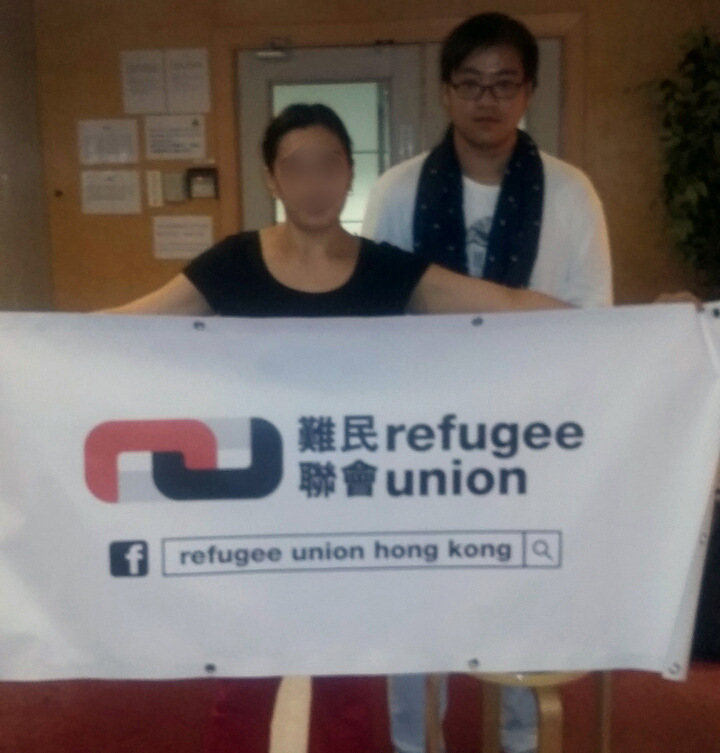
Welfare punishment is a doubtful deterrent
Apr 27th, 2015 | Crime, Housing, Legal, VF Report, Welfare | Comment
The Hong Kong government has a preference to describe asylum in negative terms: “Non-refoulement claimants in Hong Kong are illegal immigrants or overstayers, even if their claim is substantiated … they may not take up employment in Hong Kong; violation of the relevant provisions is a criminal offence punishable on conviction to a fine of up to level 5 ($50,000) or to imprisonment for three years … the sentencing guideline in respect of the relevant provision states that 15 months’ imprisonment should be imposed on a person convicted of an offence.” (Finance Committee 2015-16)
Very few lawyers stand apart for attaching the utmost importance to refugee rights and striving to ensure such rights are respected and safeguarded in the interest of the asylum community and the city’s reputation. The reality is that in most cases they have to represent clients pro bono.
In February 2014, barrister Robert Tibbo obtained leave to make an application for the judicial review of the torture claim of a South Asian woman whose appeal was dismissed without an oral hearing. Her council, a non-executive director of Vision First, argued that various factual matters relevant to the case had not been addressed by the adjudicator who cherry-picked country of origin information.
The woman sought refuge in Hong Kong in 2005 to escape from threats to her life and safety due to her political activities and the serious abuse she received from her husband affiliated to an opposing political party. As if her struggle for protection was not enough, a decade later she stood before the bench in Eastern Magistracy to answer to charges of working illegally.
In 2013, the woman was arrested by police at the back of a restaurant where she occasionally washed dishes for exploitative wages. For months she had paid cash for a dilapidated subdivided room, because the landlord refused to accept bank transfers from ISS-HK and she was unable to find alternative accommodation within the paltry rental budget that was then 1200 HK$.
It is not uncommon for refugees to rent the cheapest rooms from landlords who prefer cash payments to reporting bank transaction in income statements. In such cases tenants are obliged to secure cash somehow, or risk being homeless. Under the circumstances, the great majority of refugees seek employment in the informal economy and risk arrest, prosecution and jail for attempting to make ends meet.
Interestingly this woman’s situation ticks several failures in the current asylum policy: 1) denial of protection; 2) prolonged determination of claims; 3) prohibition from working, and 4) insufficient welfare assistance, which in this case included failure by ISS-HK to secure suitable accommodation for a vulnerable woman. Robert Tibbo is seeking a stay of prosecution arguing that systemic failures placed his client in a predicament in which she worked to avoid sleeping in the street.
At a hearing in April 2015, the magistrate suggested that a judicial review be sought against the Director of Immigration who sets the recognizance conditions, including the prohibition from taking up employment. The argument is that if the government openly met the basic needs of refugees and signed tenancy agreements, then refugees would not be compelled to work illegally.
Robert Tibbo explains, “This case is likely to go to the Court of Final Appeal. It is hardly unique since countless refugees struggle daily to pay necessary costs not met by ISS-HK. My client is a victim of an intentional failure by the Government to meet the basic needs of refugees who, when facing similar charges, often plead guilty to avoid stiffer sentences while cognizance that they were entrapped. This case has the potential of changing the system.”
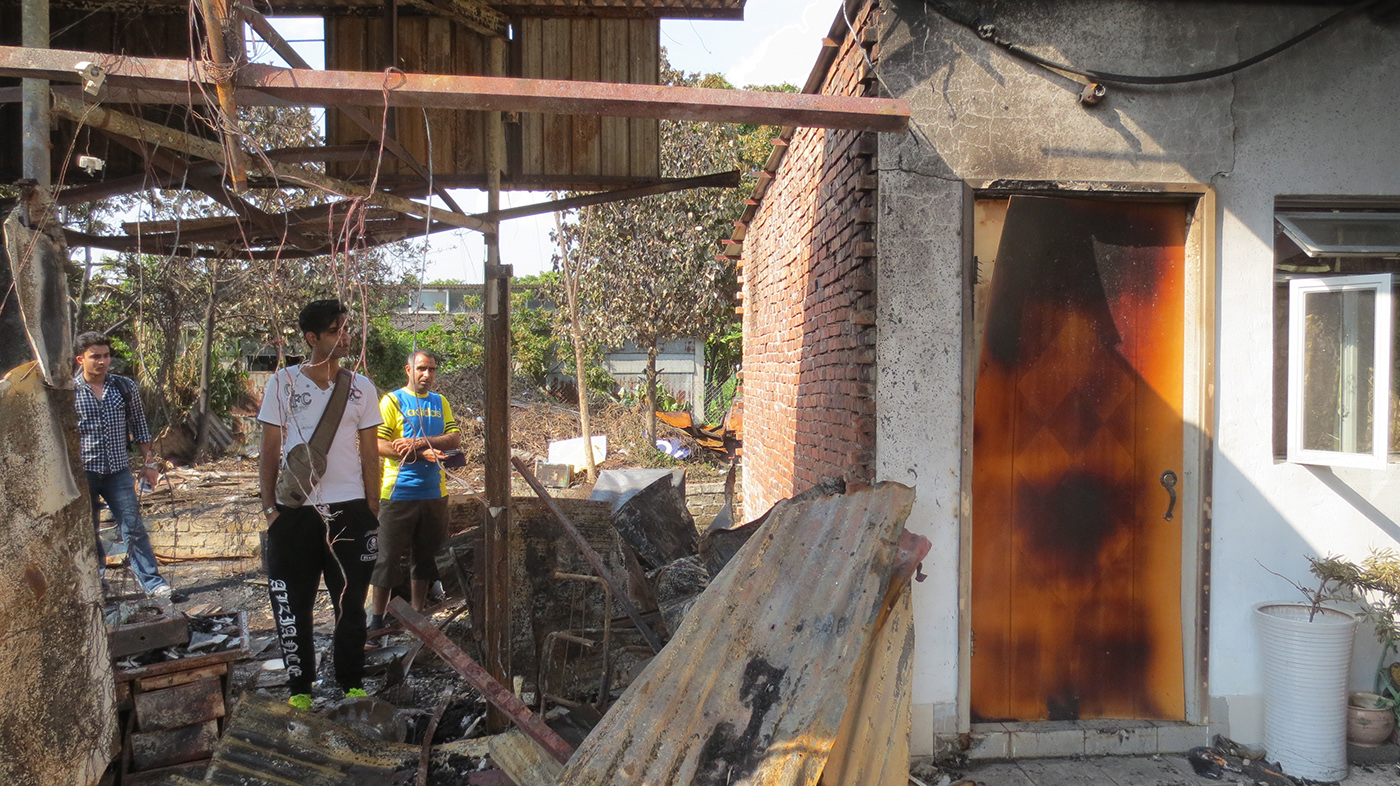
A legal and moral obligation to increase welfare to realistic levels
Apr 23rd, 2015 | Housing, Immigration, VF Opinion, Welfare | Comment
Refugees in Hong Kong worry most about two issues: protection and welfare. Over the years the Immigration Department has done little to allay suspicions that the effective zero-percent acceptance rate is a poor assessment of the asylum community. Welfare issues are equally troubling with policies that deliberately entrap refugees below the poverty line without employment rights.
On a scale of importance, Vision First is primarily concerned about the failure of the Unified Screening Mechanism to generate protection. In the interest of accountability and transparency, Immigration ought to publish monthly results to inform interested parties about its accomplishments in the asylum sphere. This would undoubtedly better inform opinions.
After Hong Kong’s top court denied the right to work in February 2014 to mandated refugees and successful torture claimants, it became disappointingly clear that the authorities are years away from granting employment rights to asylum seekers condemned, by policy and design, to a protracted state of emotional and economic destitution with deterrence aims.
A combination of questionable policies force refugees to run the gauntlet between insufficient welfare and imprisonment for working illegally. Such arrangements strike offenders heavily with arrests and imprisonment that are hardly avoidable when money must be regularly raised to meet necessary expenses, such as rent surpluses, utilities, food and clothing.
Instigated by superficial media reporting, common perception assumes that refugees should receive less welfare than impoverished residents. This is shamefully reflected in the welfare disparity between citizens and refugees, despite the former being allowed to work and the latter jailed up to 22 months for breaking the law in a hostile, and arguably unjust environment.
On 22 April 2015, Vision First and the Refugee Union met with the Hon. Fernando Cheung Chiu-hung to strategize on increasing welfare levels that are unrealistically low (HK$ 1500 for rent and HK$ 1200 for food) and have fallen behind inflection, particularly in the rental market. A first batch of 300 complaint forms were submitted to the Legislative Council’s Redress System to trigger a discussion by the Panel on Welfare that advises the government on such matters.
Questions will be raised about the adequacy of the current assistance which fail to meet the basic needs of a growing refugee population. Deterrence objectives and criminalization of vulnerable foreigners should not overshadow welfare considerations when men, women and children are suffering in our community. As long as work rights are denied, the authorities have a legal and moral obligation to increase welfare to realistic levels consistent with human right laws.
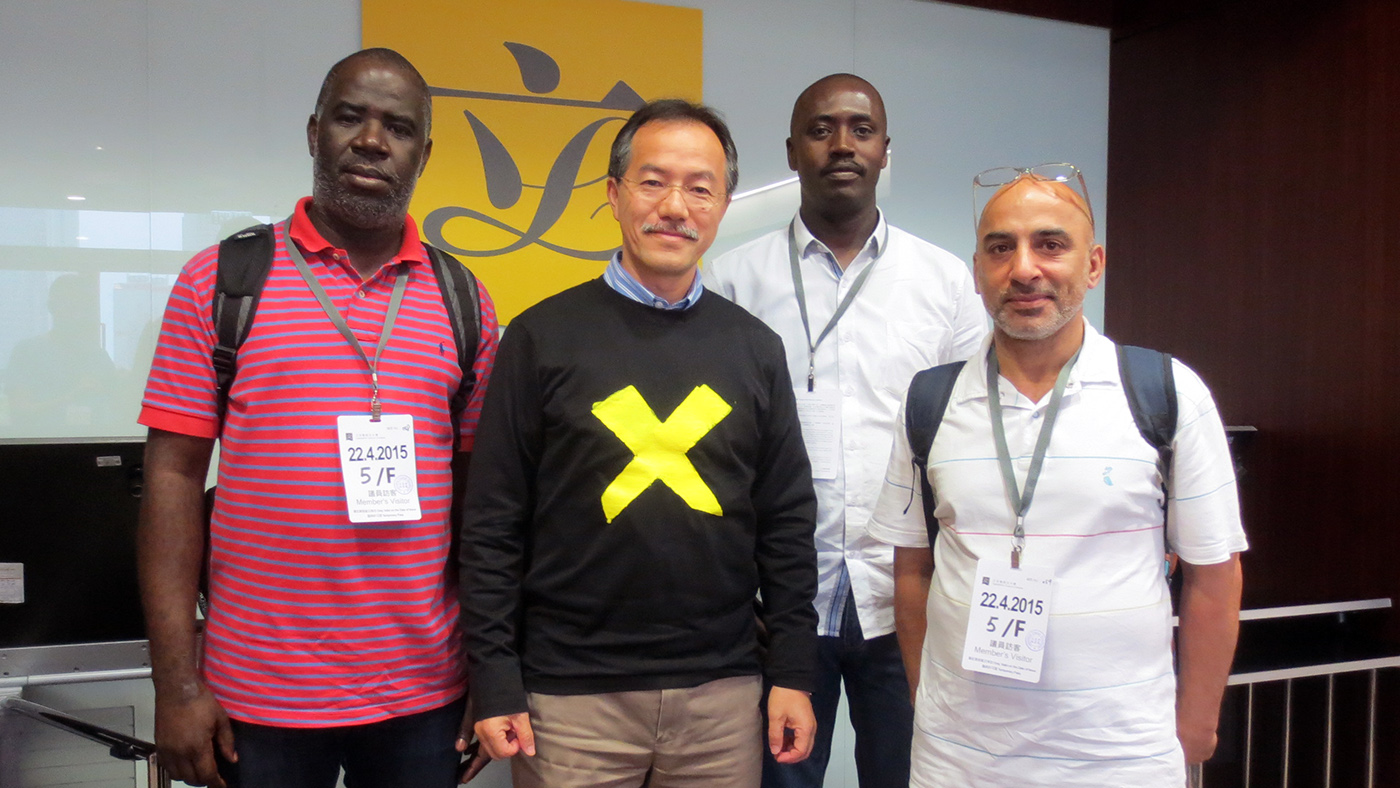
The cardboard box community of Sham Shui Po
Apr 21st, 2015 | Advocacy, Housing, VF Opinion, Welfare | Comment
A fire broke out on a remarkable foot bridge over four-lane Yen Chow Street West in Sham Shui Po on the night of 19 April 2015. This pedestrian crossings was home to over a dozen homeless persons who lived in semi-permanent huts made of plywood, cardboard and plastic sheets. Some had lived there for years.
News of the fire spread quickly among refugees who three times a month join a local charity, which prefers to remain anonymous, to distribute food to this homeless community comprising mostly elderly and troubled residents. This humanitarian service has brought refugees closer to impoverished residents who suffer similar neglect and deprivation in our affluent city.
While firefighters doused the flames, several concern groups rushed to offer assistance and speak about the shameful conditions endured by several hundred vulnerable persons in the neighbourhood. A Refugee Union member later observed, “NGO people should coordinate efforts to advocate for badly needed changes … better welfare and proper homes is what these people need … Isn’t the government ashamed how people suffer in the streets?”
After the fire, a passive-reactive government did what it does best – lock the stable doors after the horse has bolted. Drawing parallels with the fires that brought death and destruction to refugee slums, the Fire Service Department clamped down on the homeless people living on that food bridge with little concern where they would end up sleeping – possibly under a different flyover.
An NGO worker familiar with the area reported that there are over 60 Vietnamese refugees living in cardboard huts under that section of the West Kowloon Corridor. A long row of huts adjacent to the Tung Chau Street Park offers a sheltered space for sleeping and storage. These shacks are apparently tolerated by the authorities on the hidden side of the wet market where they are less likely to offend the public conscience.
It is understood that the refugees living there collect groceries at the ISS-HK appointed shops and cook with gas stoves on the pavement. There is no electricity for refrigerators. These refugees are unable to rent rooms for the 1500$ allowance and lack the organizational skills to request better assistance. They might strengthen statistics presented to the Social Welfare Department that encompass refugees who collect food rations, but seemingly do not require rent assistance.
Vision First will partner with Refugee Union to plan a Vietnamese language drive to reach out to this most marginalized and uninformed sub-group said to comprise veterans who have been in Hong Kong for twenty years as well as newcomers who arrived within the last year.
The plight of the homeless ought to be a concern for all citizens privileged to sleep under a proper roof. The human suffering caused by ineffective policies ought to resonate with everyone as we wonder why government and community are failing the most vulnerable in society, citizens and foreigners alike.
“Tonight we will gather to serve the homeless again,” remarked a refugee mother, “There are people suffering worse than us and this (community service) opened my eyes. I cannot work, but I can help other needy people. This is very meaningful for me. At the end of the day we are the suffering people … It doesn’t matter the colour of our skin or where we come from.”
Did child services fail Precious?
Apr 2nd, 2015 | Food, Housing, VF Report, Welfare | Comment
Is it right for a government contractor, financed by hundreds of millions of dollars from the Social Welfare Department, to transfer a 3 year-old child into the care of a destitute refugee woman without adequate support? What if the woman met the girl only a few days earlier?
Several months ago Vision First raised a complaint with SWD about a little girl who showed up at our office unwanted by the refugee carers who were stuck with her after the mother was jailed for 18 months for working illegally, possibly to raise a daughter in this expensive city.
Presumably the SWD has operating procedures for its child services department tasks to provide assistance for young children whose parents are incarcerated and who, after the age of 3, are no longer allowed to stay in prison with a parent. This is what happened to Precious.
Two refugee friends of the incarcerated mother anxiously sought our assistance and we raised our concerns with the SWD, as we didn’t have resources to care for children, particularly of such a young age without parents. The women complained that ISS-HK had entrusted them with Precious without providing adequate assistance to look after and care for her day and night.
Last week a third refugee mother produced an ISS-HK document stating, “This care giving agreement is made out of good will and compassion to the child as there is no other person or institution that can look after the child while her mother is restricted to provide care and custody in view of detention. This agreement includes care giving to the child, collection of her food … accessing health care facilities when the child needs medical treatment, escorting child in reporting to ISS-HK for contract renewal.”
The agreement fails to mention the countless tasks a parent performs in child-care: cooking, cleaning, bathing, clothing, playing, talking, teaching, putting to bed … and generally paying full attention to the wellbeing and happiness of children. Any parent will agree that caring for children is a never-ending obligation typically performed at great personal sacrifice.
Why was Precious entrusted to a refugee women she had never met before? Assuming the women is wonderful (she is), is it right for a child to live in a tiny partitioned room without ventilation, kitchen, bathroom or even a functioning TV? Is the women expected to cook, bath and cloth and share a single bed with a little girl who is not her daughter? Is she expected to provide motherly care as a destitute refugee without financial assistance? How can the women travel on her daily routine without even a child Octopus card?
Would this be an acceptable treatment for resident children in the care of SWD?
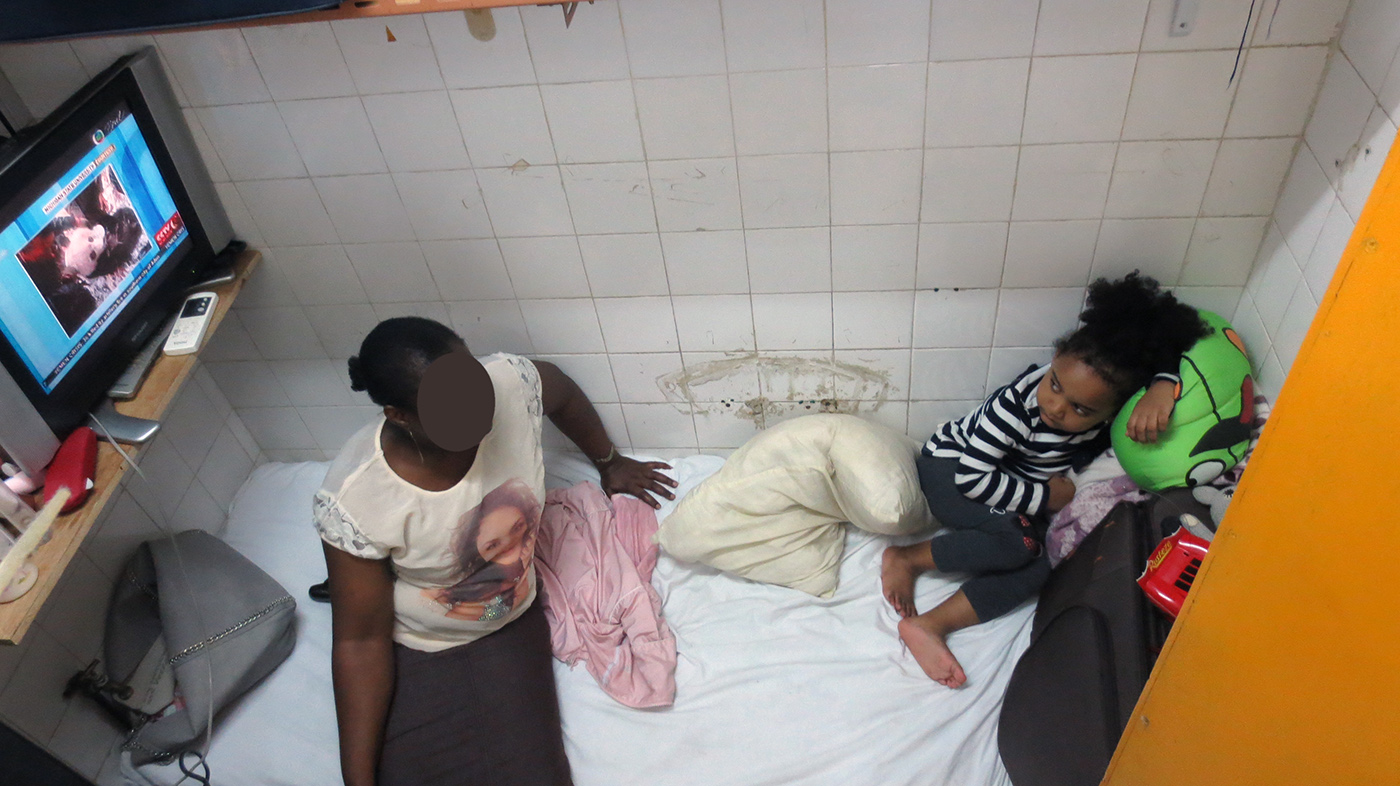
Complaint to the Legislative Council Redress System
Apr 1st, 2015 | Advocacy, Food, Housing, Legal, VF updates, programs, events, Welfare | Comment
Asylum seekers and refugees rely entirely on the Hong Kong Government and Social Welfare Department (“SWD”) distribution of government assistance provision through International Social Services (ISS-HK). They are not allowed to work and are sentenced to 15-22 months imprisonment if arrested working. They have no savings, no income, no bank account, nor can they rely on social networks, NGO assistance or help from family and friends. Under these conditions, they are not afforded adequate support to meet their most basic needs. While they struggle to survive, the situation is degrading, humiliating and in breach of their rights as persons granted non-refoulement protection in Hong Kong. Over the years they have repeatedly requested to bring their assistance to an adequate level, but they have been systematically and incomprehensively left in a destitute state. The limited and insufficient assistance they receive makes it impossible for them to survive on a day to day basis, particularly in the face of soaring rents.
Vision First request that the Hong Kong Government, the Security Bureau and SWD fulfill their obligation to provide for asylum seekers and refugees’ basic financial, material needs or otherwise. These needs include, but are not limited to, appropriate quantity and quality of food assistance, payment of full rent and utilities, payment of full rental deposits to landlord, daily necessities like cooking gas, clothing, health care, transport allowance for required trips always payable in full and in advance. We request that ISS-HK sign the Tenancy Agreements as refugees have no savings or income to pay rent balances every month.
We formally request that a public hearing be held to discuss these matters that concern all persons requesting and having been granted international protection in Hong Kong, who in March 2015 amounted to over 10,000 individuals, increasing by 300 every month.
Vision First further request that a Task Force be established to investigate why persons requesting and having been granted international protection in Hong Kong have been left destitute despite a system being in place to disburse government funding to prevent this condition from happening. Such policy failures have caused refugees needless and unreasonable physical, mental and psychological suffering.
Vision First invites refugees to download and complete the form below that will be filed at the Complaints Office of the Legislative Council Secretariat over the coming weeks and months.
The hidden and dangerous refugee slums of Hong Kong
Apr 1st, 2015 | Housing, Media, Welfare | Comment


